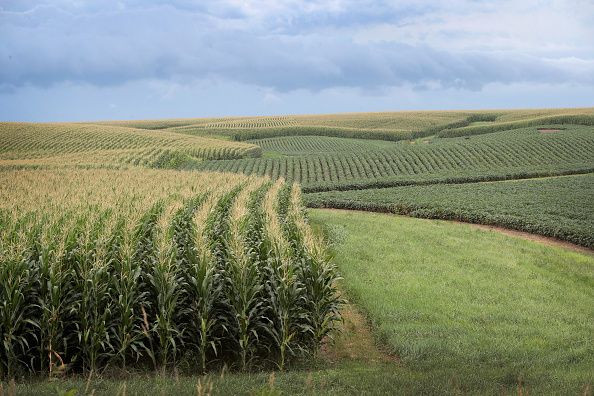The Future Of Farming Requires Banks Leading

It is a challenging time to be part of the food and land use value chain. We live in a world where a third of all food produced is wasted, at a cost of over a trillion dollars a year to the global economy. At the same time, more than 800 million people still go to bed hungry each day and food insecurity is rising, disproportionately affecting women and farmers. More than three-quarters of global poverty is now concentrated in rural areas, where smallholders struggle to get access to finance or the tools they need to operate sustainably.
These issues are compounded by the fact that rural communities are at the frontline of climate change. We are living through the hottest decade on record, seeing more frequent natural disasters and losing biodiversity at unprecedented rates – with over a million species on the verge of extinction. Recent images of the forest fires in the Amazon remind us that tropical deforestation accounts for around 15% of global greenhouse emissions each year and is a major driver of global heating and environmental degradation. According to the latest report from global ratings agency S&P, banks are probably significantly underestimating these risks in their portfolios.
It is clear that key parts of today’s food systems are not working for the planet, or for people. The good news is that banks such as Rabobank can help accelerate the shift to a more sustainable food and land use economy.
In part, this is a matter of good risk management: lenders and investors in agriculture are just as exposed to the risks of the industries they finance. In addition to physical climate risks, there are a broader set of nature-related stresses like water scarcity and loss of soil health. The agro-food sector may also face growing litigation and regulatory risk related to hidden health costs associated with pesticide use or obesity.
Of course, sustainability is not only about risk but also about value creation. A new report by the Food and Land Use Coalition identifies an annual $4.5 trillion in new business opportunities if we shift to a more sustainable model food and land use. The opportunities are wide-ranging and include tackling food loss and waste, tech solutions for supply chain efficiency, higher yields from regenerative agriculture, payments for ecosystem services and new markets in aquaculture and alternative proteins.
Most importantly, this is about responsibility. Banks should work with farmers to become more productive by being more sustainable. What we have seen at Rabobank is that this is not only good for farmers but also ensures that crops are more resilient to climate change, can generate higher yields and produce more nutritious foods. What is good for people and the planet is also good business.
Of course, shifting an entire system with many complex value chains and stakeholders is easier said than done. We are still a far way off translating today’s hidden costs of an unsustainable system into tomorrow’s markets and business opportunities, though early-stage growth funds like Rabobank’s Food and Agriculture Innovation Fund should help to spur innovation. It is also exciting to see so many entrepreneurs leading the charge, including companies like Yume, the online marketplace for quality surplus food to reduce food loss and waste, or Protix, which is pioneering the insect protein market as a low-carbon source of animal feed.
We now need bold leadership from the financial community and strong partnerships between the public and private sector to accelerate investment for this agenda, especially in emerging markets. New financial products – like the $2.1 billion sustainability-linked loan recently signed by agricultural commodity giant COFCO – are already helping to shift incentives. The interest rate of the loan is tied to COFCO’s sustainability performance where targets include year-on-year improvement in ESG performance and better traceability of agriculture commodities, particularly directly sourced soy in Brazil.
The Food and Land Use Coalition report also recommends scaling the use of blended finance mechanisms – where public or philanthropic money help to de-risk sustainable food and land use projects and platforms. Clarmondial’s Food Securities Fund is a good example. The fund provides affordable loans to agriculture players who implement best-in-class environmental and social practices and benefits from a partial guarantee from USAID. The development guarantee reduces the risk for commercial players looking to gain exposure to climate-smart agriculture and deforestation-free supply chains in growth markets.
The AGRI3 Fund is another example of blended finance at work. AGRI3 provides tailor-made technical assistance for farmers to employ more sustainable practices that avoid deforestation, promote reforestation and support sustainable agroforestry models.
Of course, if we are going to transition to a more sustainable food and land use economy, then we also need strong policy signals. Repurposing agricultural subsidies will be critical, as will incorporating nature and biodiversity into the Task Force on Climate-related Financial Disclosures and incorporating Natural Capital Accounting practices across government.
Ultimately, if we are going to tackle climate change and feed the next billion people sustainably, then we have to act now. There are parts of the Food and Land Use Coalition report that raise difficult questions for the industry and we welcome the important debate that many of the conclusions will generate. However, what the report makes abundantly clear is that there is a big win-win for farmers, the environment, consumers and investors if we reach out to take it. At Rabobank, we know that better business models can help tackle climate change and inequality, protect natural capital and precious ecosystems, and support a more inclusive, healthy society. So this is no longer a question of whether we need to become more sustainable, but how we can help our clients in the food supply chain make this work.
Wiebe Draijer is Chairman of the Managing Board of Rabobank
© Copyright IBTimes 2024. All rights reserved.





















